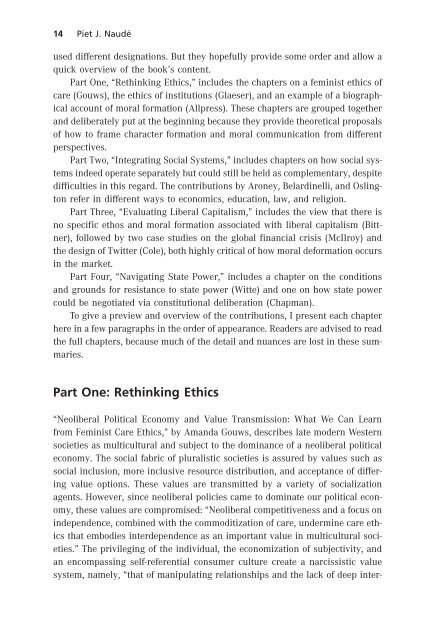Piet Naudé | Michael Welker | John Witte, Jr. (Eds.): The Impact of Political Economy (Leseprobe)
In our late modern pluralistic societies, there are tensions and complementarities between a plurality of individual and social claims and activities to shape societal life and a constructive pluralism of what is known as social systems. The latter provide normative codes and powers emanating from the areas of law, religion, the family, the market, the media, education, academic research, health care, defense and politics. A better understanding and steering of this complex division of powers is crucial for the common good and for freedom and peace. In this volume, a multi-disciplinary team of experts from Germany, Italy, Australia, the UK, the USA, and South Africa bring their conceptual, empirical and historical insights to bear in three broad sections: »The moral dimension of social systems«; »The interaction of religion, law and education with political systems«; and »The moral (mal)-formation evident in case studies on the global financial crisis and social media«.
In our late modern pluralistic societies, there are tensions and complementarities between a plurality of individual and social claims and activities to shape societal life and a constructive pluralism of what is known as social systems. The latter provide normative codes and powers emanating from the areas of law, religion, the family, the market, the media, education, academic research, health care, defense and politics. A better understanding and steering of this complex division of powers is crucial for the common good and for freedom and peace.
In this volume, a multi-disciplinary team of experts from Germany, Italy, Australia, the UK, the USA, and South Africa bring their conceptual, empirical and historical insights to bear in three broad sections: »The moral dimension of social systems«; »The interaction of religion, law and education with political systems«; and »The moral (mal)-formation evident in case studies on the global financial crisis and social media«.
Create successful ePaper yourself
Turn your PDF publications into a flip-book with our unique Google optimized e-Paper software.
14 <strong>Piet</strong> J. <strong>Naudé</strong><br />
used different designations. But they hopefully provide some order and allow a<br />
quick overview <strong>of</strong> the book’s content.<br />
Part One, “Rethinking Ethics,” includes the chapters on afeminist ethics <strong>of</strong><br />
care (Gouws), the ethics <strong>of</strong> institutions (Glaeser), and an example <strong>of</strong> abiographical<br />
account <strong>of</strong>moral formation (Allpress). <strong>The</strong>se chapters are grouped together<br />
and deliberately put at the beginningbecause they provide theoretical proposals<br />
<strong>of</strong> how to frame character formation and moral communication from different<br />
perspectives.<br />
Part Two, “Integrating Social Systems,” includes chapters on how social systems<br />
indeed operate separately but could still be held as complementary, despite<br />
difficulties in this regard. <strong>The</strong> contributions by Aroney, Belardinelli, and Oslington<br />
refer in different ways to economics, education, law, and religion.<br />
Part Three, “Evaluating Liberal Capitalism,” includes the view that there is<br />
no specific ethos and moral formation associated with liberal capitalism (Bittner),<br />
followed bytwo case studies on the global financial crisis (McIlroy) and<br />
the design <strong>of</strong> Twitter (Cole), both highly critical <strong>of</strong> how moral deformation occurs<br />
in the market.<br />
Part Four, “Navigating State Power,” includes achapter on the conditions<br />
and grounds for resistance to state power (<strong>Witte</strong>) and one on how state power<br />
could be negotiated via constitutional deliberation (Chapman).<br />
To give apreview and overview <strong>of</strong> the contributions, Ipresent each chapter<br />
here in afew paragraphs in the order <strong>of</strong> appearance. Readers are advised to read<br />
the full chapters, because much <strong>of</strong> the detail and nuances are lost in these summaries.<br />
Part One: Rethinking Ethics<br />
“Neoliberal <strong>Political</strong> <strong>Economy</strong> and Value Transmission: What We Can Learn<br />
from Feminist Care Ethics,” by Amanda Gouws, describes late modern Western<br />
societies as multicultural and subject to the dominance <strong>of</strong> aneoliberal political<br />
economy. <strong>The</strong> social fabric <strong>of</strong> pluralistic societies is assured by values such as<br />
social inclusion, more inclusive resource distribution, and acceptance <strong>of</strong> differing<br />
value options. <strong>The</strong>se values are transmitted by avariety <strong>of</strong> socialization<br />
agents. However, since neoliberal policies came to dominate our political economy,<br />
these values are compromised: “Neoliberal competitiveness and afocus on<br />
independence, combined with the commoditization <strong>of</strong> care, undermine care ethics<br />
that embodies interdependence as an important value in multicultural societies.”<br />
<strong>The</strong> privileging <strong>of</strong> the individual, the economization <strong>of</strong>subjectivity, and<br />
an encompassing self-referential consumer culture create anarcissistic value<br />
system, namely, “that <strong>of</strong> manipulating relationships and the lack <strong>of</strong> deep inter-
















